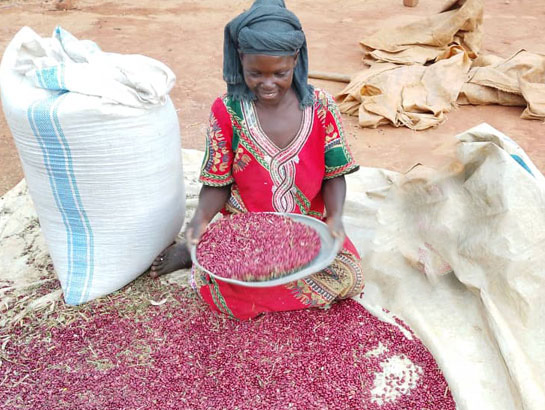HarvestPlus works to support smallholder farmers, especially women, to enhance their food and nutrition security while improving their household incomes, by providing affordable, high-quality biofortified seeds and training on the agronomic, nutritional, and health benefits of biofortified crops. These initiatives are transforming the lives of farmers like Madina Nangendo, a 38-year-old female farmer from Zinunula Kayonza Farmer’s Group in Luweero district, Uganda. Nangendo grows a variety of crops to meet her family’s food needs on her three-acre farm and supplements her income by selling the surplus produce.
Prior to her involvement with HarvestPlus, Nangendo primarily grew crops like banana, cassava, maize, and beans for family food, and coffee as a primary cash crop. Her farming practices centered on intercropping, with coffee as the main crop and beans providing additional sustenance. Before discovering biofortified varieties, Nangendo typically planted unimproved bean varieties, yielding about 100 kilograms (kg) of beans from every 20 kg of seeds planted. This return of five kg per one kg of seed was the norm, but she was always hoping for a crop that could better withstand adverse conditions and provide a higher yield.
Through the Expanding Nutrients in Food Systems project, a HarvestPlus led initiative funded by the Government of Canada, Nangendo was introduced to an iron-enriched bean variety (NARO Bean 6). This variety is one of the several iron bean varieties bred to be high yielding and more drought tolerant, making it suitable for improving nutrition while strengthening food security and resilience to climate shocks. After a community sensitization on the agronomic, nutritional, and health benefits of biofortified varieties, Nangendo was convinced to purchase four kg of iron bean seed from a local agro-dealer. In 2024, Nangendo planted her iron bean seed, despite an unexpected dry spell that impacted crop growth. Surprisingly, she was able to harvest 100 kg of beans from just 4 kg of seeds. “I am amazed by how well these beans performed,” Nangendo shared. “Even with the drought during flowering, I still achieved the best yield I’ve ever had since I started growing beans. This variety is not only high-yielding but also drought-tolerant. The HarvestPlus team taught us the best practices for managing these beans and highlighted their nutritional benefits—they are rich in iron and great for our health.”
Nangendo’s experience underscores the benefits of iron bean varieties that were bred to be high-yielding, drought tolerant, early maturing, and nutritious. With her 100-kg harvest, she plans to sell half of the beans to meet her family’s financial needs and use the remaining harvest for household food and replanting in the next season.
HarvestPlus is empowering smallholder farmers, particularly women, by making biofortified seed accessible to them and by equipping them with the knowledge to cultivate these nutritious crops. Nangendo’s success with iron beans is a demonstration of the potential of biofortified varieties to improve food security, enhance nutrition, and provide a stable income source for smallholder farmers even in less-than-ideal growing conditions. As more farmers adopt these biofortified crops, they can look forward to improved family health, increased yields, and more resilient livelihoods.
